You might be familiar with the “Shopify vs Godaddy” debate that has been going on for years. This time, we’re bringing you all the facts about the two giant online store builders that could directly compete with one another.
As the world’s largest self-serve platform, Shopify powers over million businesses of all sizes, but what makes it stand out from the crowd? What does it offer to businesses that other platforms can’t? In this Shopify vs. Godaddy blog post, we’ll reveal some of the most significant dissimilarities between the two giants and highlight the pros and cons of each platform. We’ll also discuss which one is best suited for your business needs.
We’re going to decide for you, but first, let’s see what each company offers.
Shopify Vs GoDaddy: Background
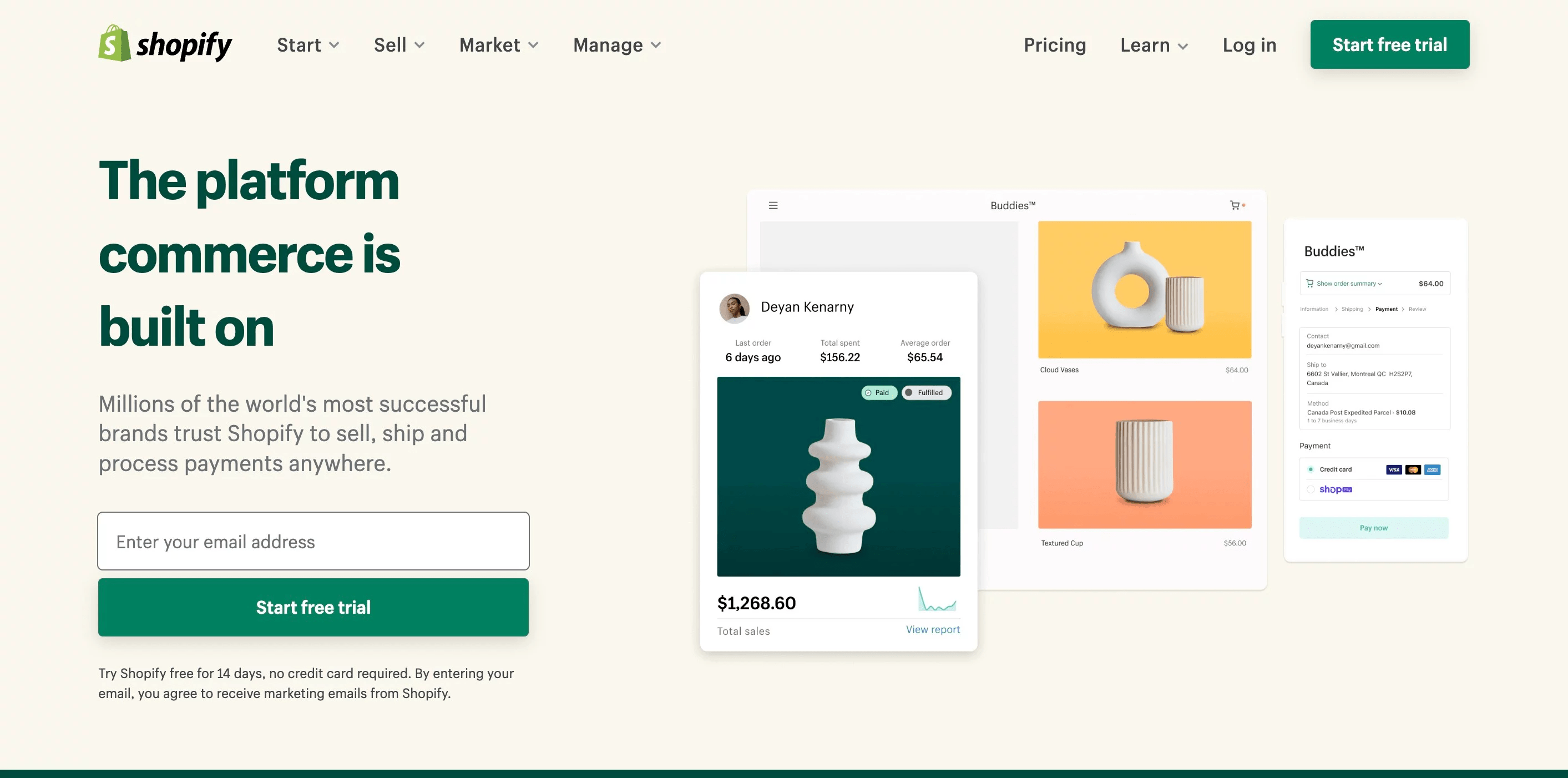
Shopify
Shopify is the platform that started the whole eCommerce revolution. Launched in 2006, Shopify is a Canadian-based company that was the first to offer a robust eCommerce platform that didn’t require the user to have a web hosting. It was the first to provide an API that allowed merchants to create their own online stores. Read How does Shopify Work: Essential Information for 2022
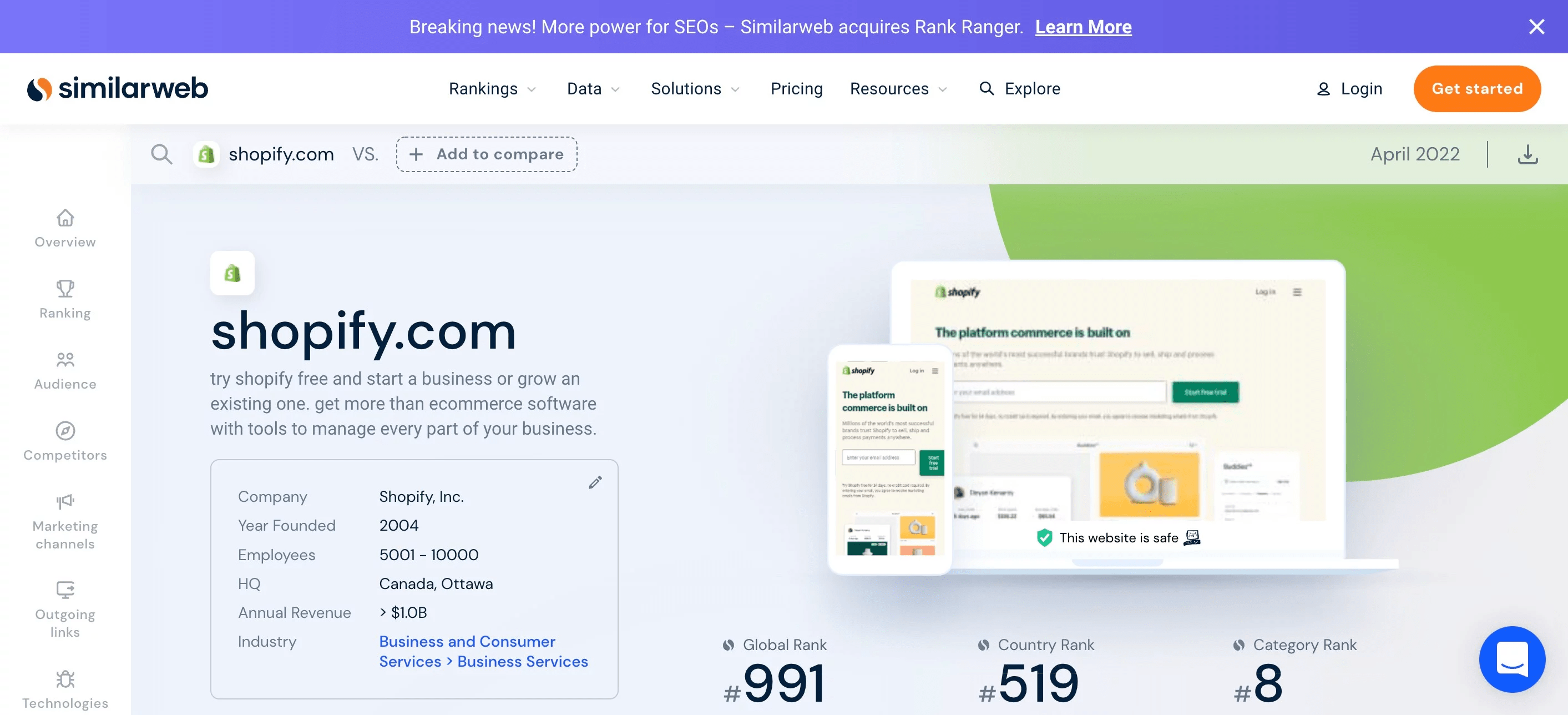
Shopify is an online store builder platform that helps businesses sell their products and services to consumers worldwide. It is a cloud-based commerce system that small businesses and large organizations can use to build and manage their online stores.
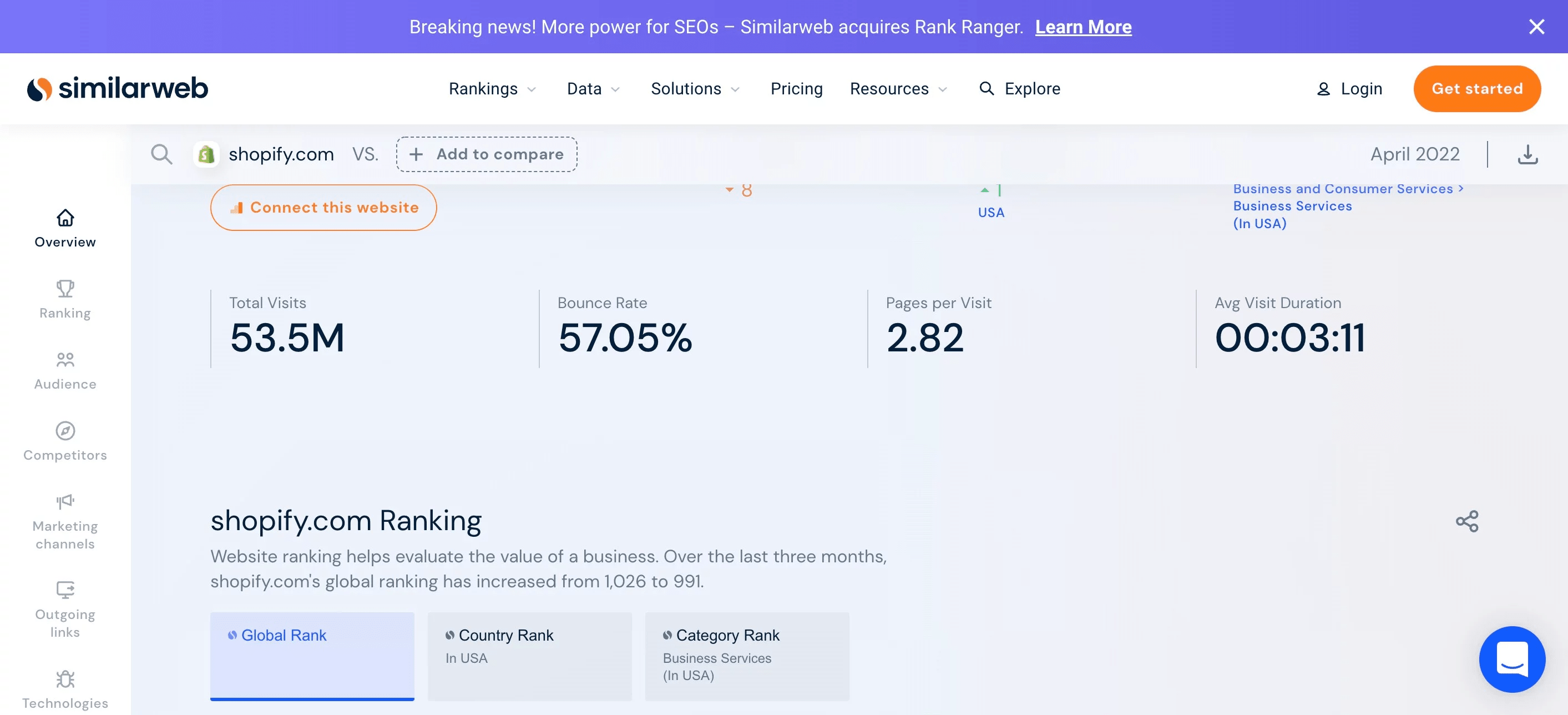
As Shopify’s popularity continues to grow, so too does the competition. Over the past two years, the company behind the leading platform for building eCommerce websites has grown by leaps and bounds. The most recent numbers show that the company now has over 53 million visitors per month and $1 billion in revenue- source Similerweb. More than 10,000 employees work for Shopify. Read Why Should You Buy Shopify Store for Dropshipping in 2022?
GoDaddy
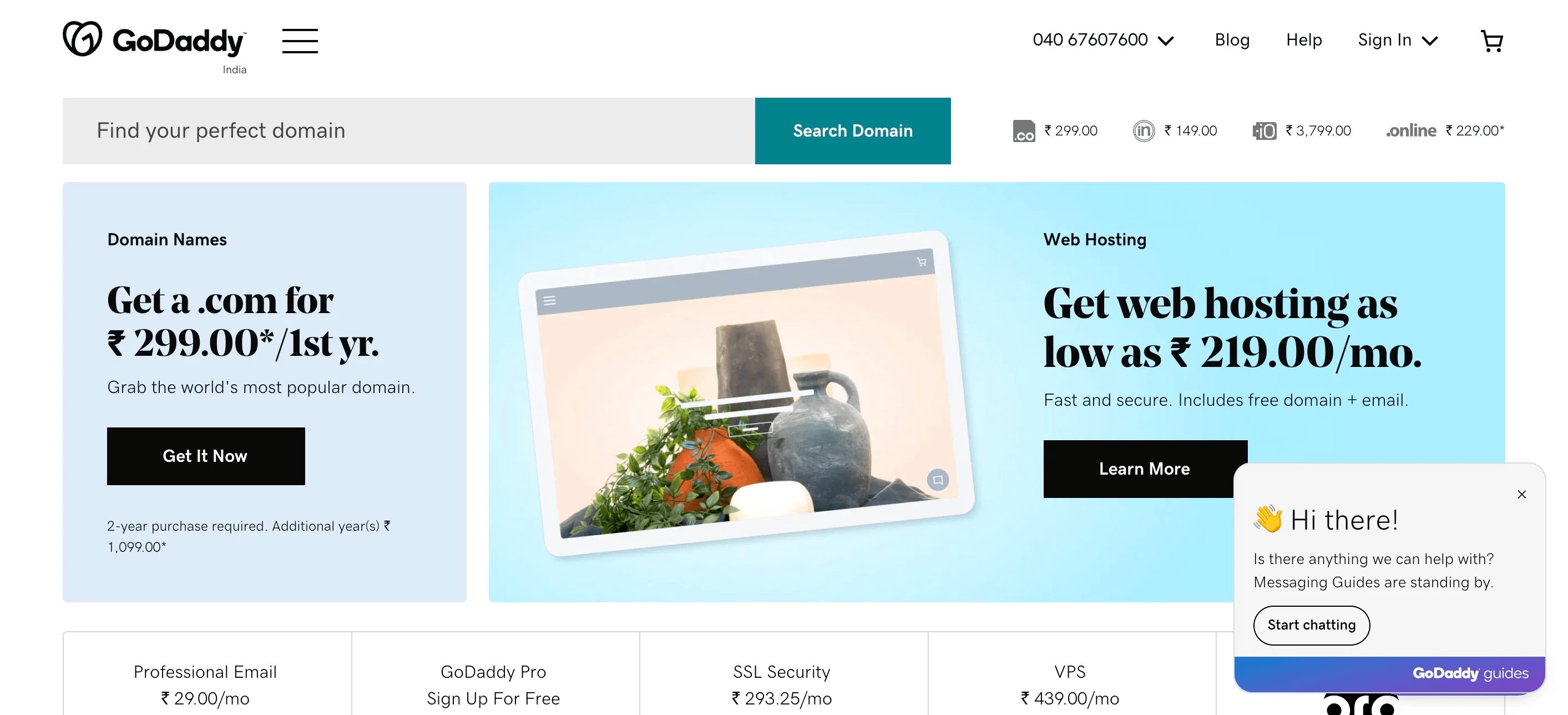
GoDaddy was established in 1997 as a domain name registrant and is still a global leader in delivering more than 84 million domains and employing more than 10,000 workers.
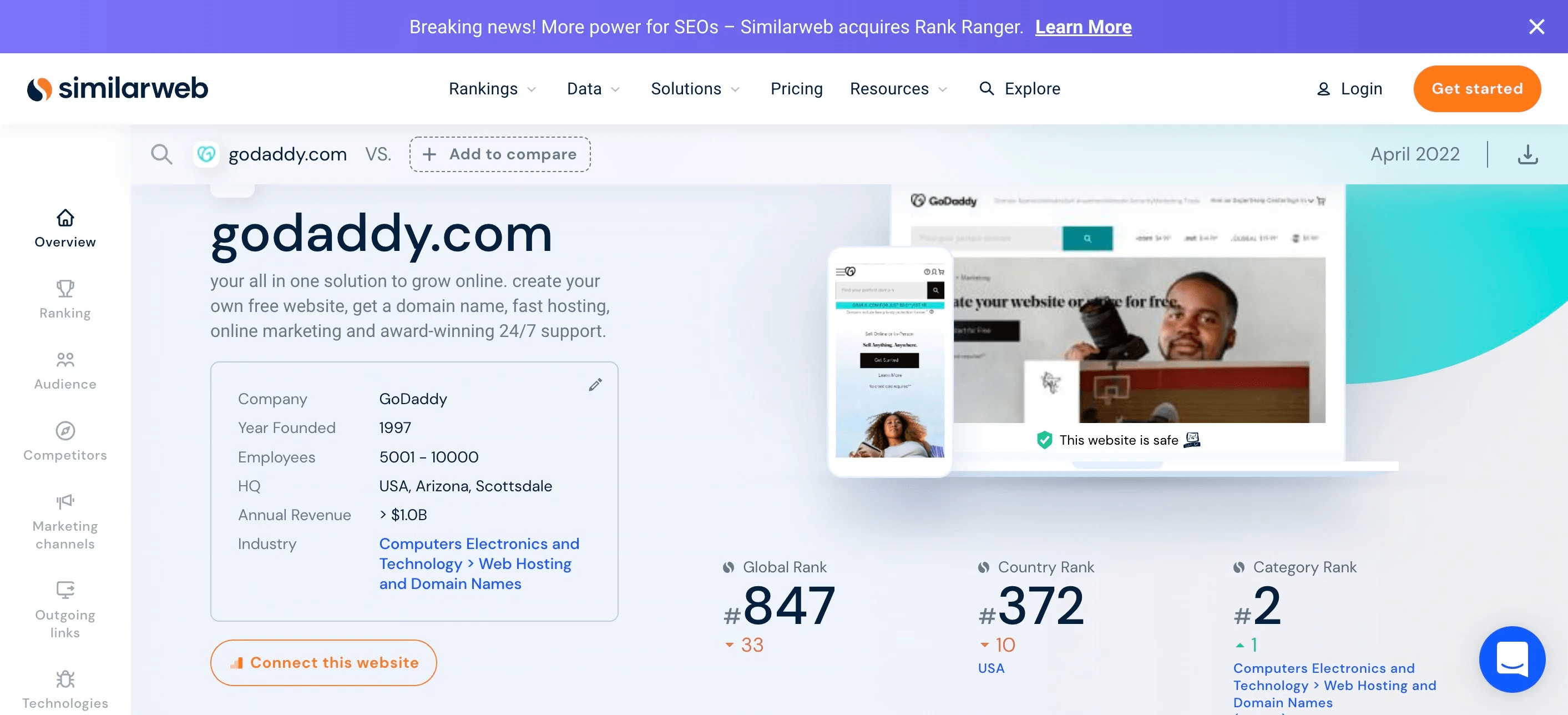
But nowadays, GoDaddy provides many web hosting services that do not only deal with domain names anymore. The latest version allows you to build websites or build a store on its site. The company has over 40 million visitors per month and over $1.0 billion in revenue.
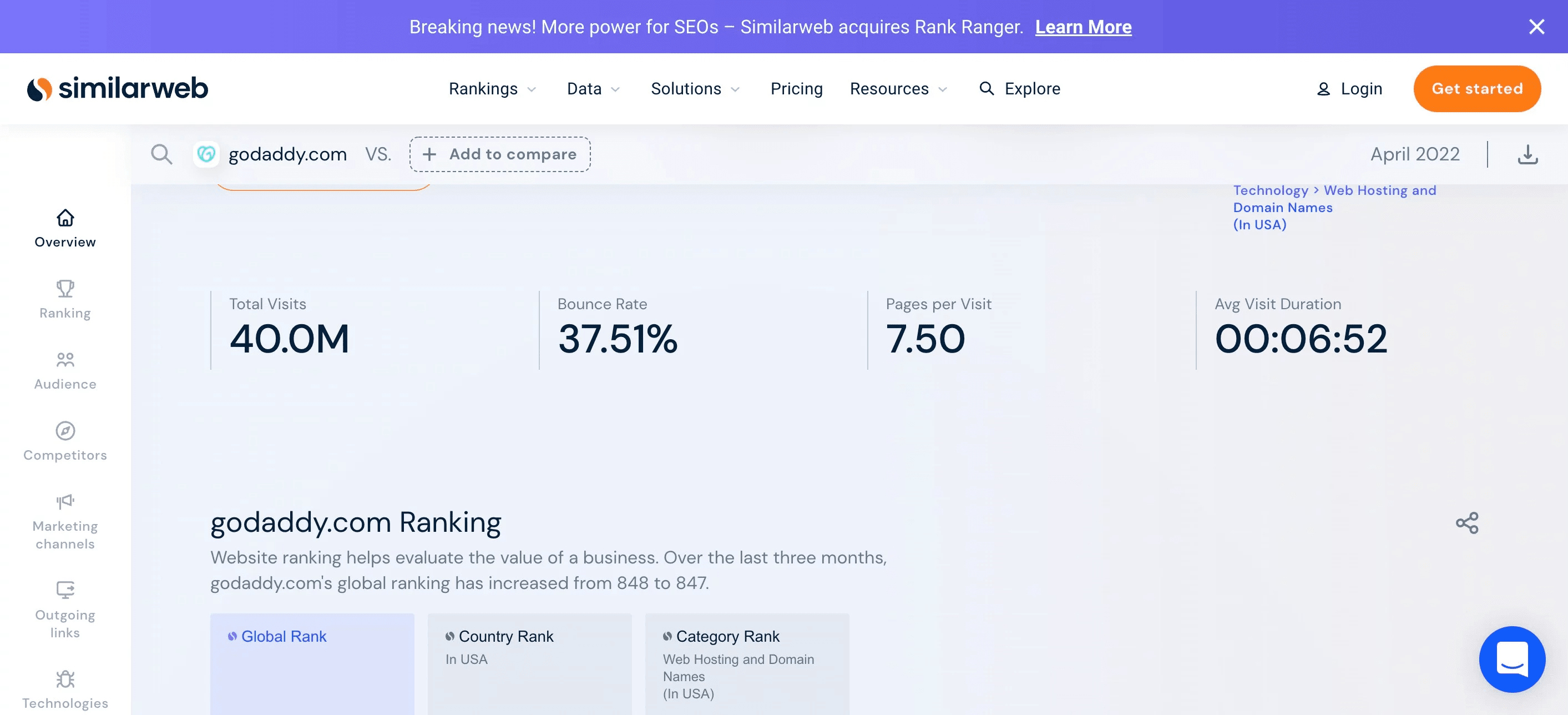
While Shopify is the big name when it comes to eCommerce platforms, there’s no doubt that GoDaddy is a strong contender.
Shopify Vs Godaddy: Pricing
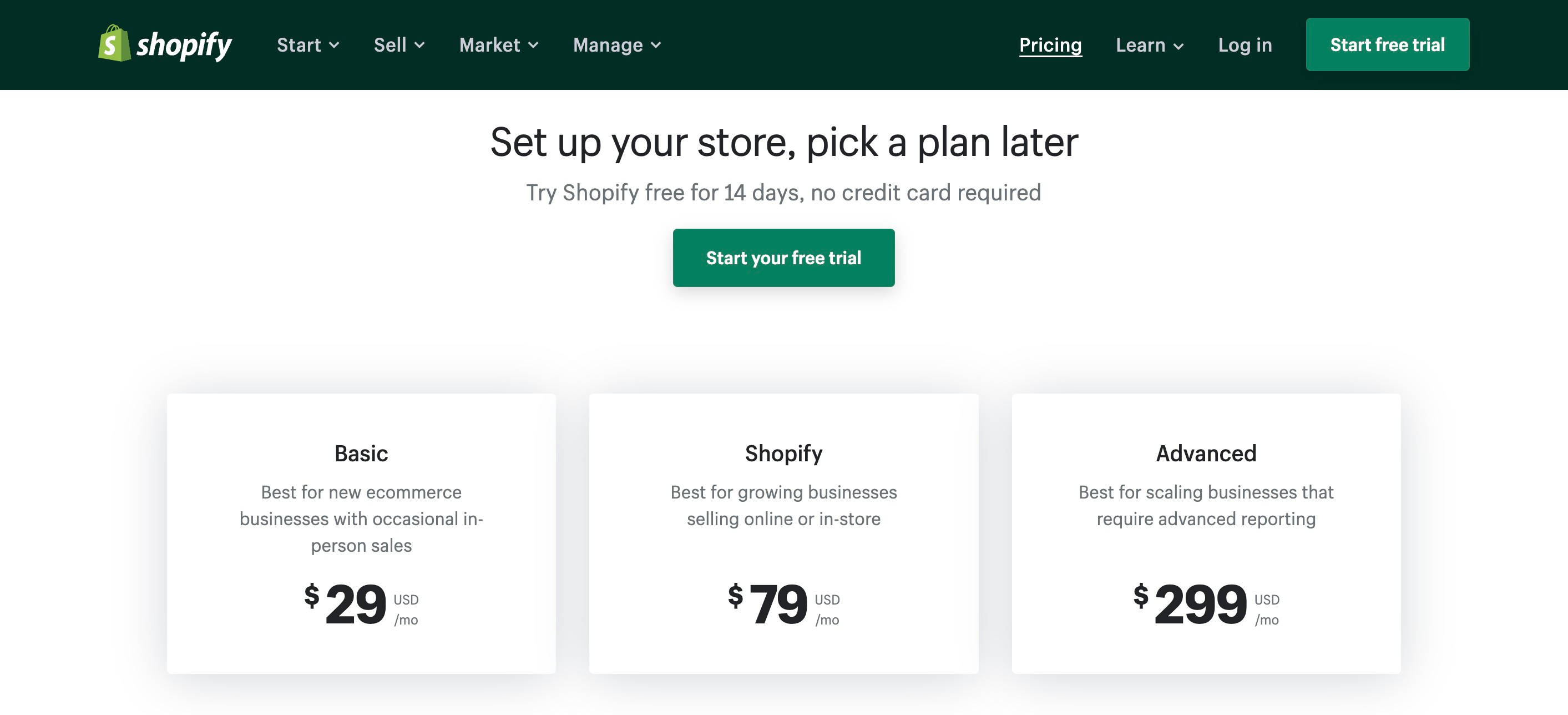
When it comes to Shopify vs Godaddy, pricing is one of the main differences between the two. Shopify has a few different plans, but their basic plan starts at
- 14 days free trial.
- Basic-$29 per month.
- Shopify- $79 per month.
- Advanced- $299 per month.
- Shopify plus starts from $2000.
- Shopify lite-$9 per month.
You’ll be charged a transaction fee if you want to use third party payments than their in-house payment processing system.
Basic ($6.99 per month)
Basic Shopify is the perfect choice for small business owners who want to start their own eCommerce store. You’ll get all of these essential features and 2 stuff accounts with this plan.
A shop engine that allows users and shoppers alike access to your products through browsing or searching; An intuitive user interfaces so everything about running an online storefront can be managed in one place.
Shopify ($79 per month)
The premium Shopify plan is ideal for businesses looking to take their eCommerce store to the next level. This plan gives you everything found in the basic Shopify plan, 5 stuff accounts, standard reporting, etc.
Shopify Advanced ($299 per month)
Shopify advanced is the most comprehensive Shopify plan and is perfect for businesses looking to scale their eCommerce operations. This plan gives you everything found in the Shopify plan, plus 15 staff accounts, advanced reporting, and fraud analysis.
Shopify Plus (Start from $2000 per month)
Shopify Plus is Shopify’s enterprise eCommerce platform. Shopify Plus is a fully-managed platform that gives you everything you need to run your business at scale.
Lite Plan ( $19 per month)
The Shopify Lite plan is perfect for basic businesses that want to add eCommerce functionality to an existing website or blog.
The ability to add Shopify buy buttons to any website or blog; An intuitive user interfaces so everything about running an online storefront can be managed in one place.
Sign up for Shopify Free Trial!
GoDaddy Pricing
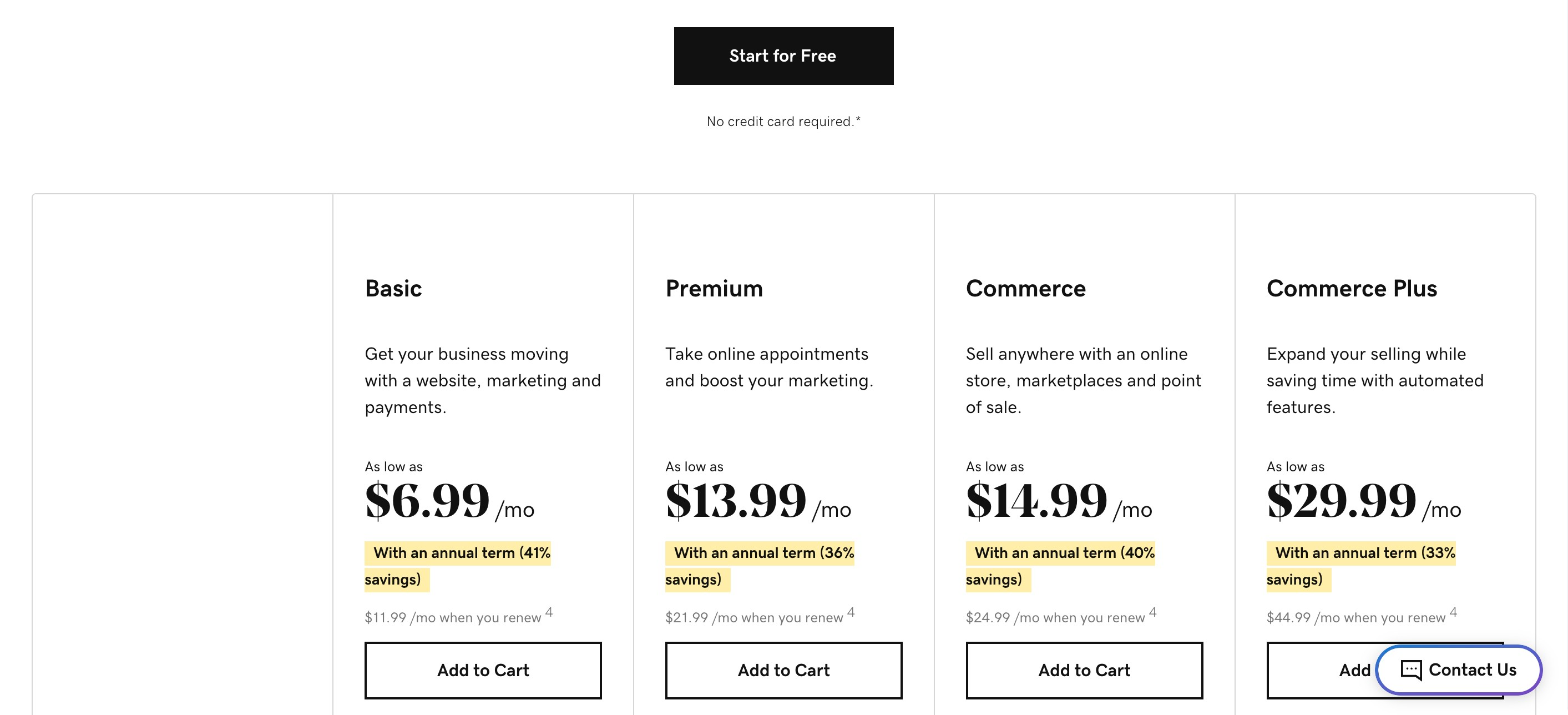
GoDaddy offers a free plan that lets you host your website for as long as possible. For more functionalities, you can upgrade; they have paid plans with more features!
Godaddy, on the other hand, GoDaddy pricing structure starts-
- Basic- $6.99 per month.
- Premium- $13.99 per month.
- Commerce- $14.99 per month.
- Commerce Plus- $29.99 per month.
Basic ($6.99/month)
The Basic Shopify GoDaddy plan is perfect for businesses that want to start their eCommerce store. With this plan, you’ll get all of these essential features:
- Create your own eCommerce website and Set up a custom domain name on your site.
- You can accept online bookings, and Inbound marketing analytics involves looking at data from various sources to understand the traffic and buying patterns on your site.
- Can take payment with GoDaddy payments.
Commerce and eCommerce plan
- You can create a standalone online store.
- Get access to the SEO feature.
- Commerce plans allow you to sell up to 5,000 products, and with Commerce plus, you can sell an unlimited number of products.
Shopify Vs Godaddy: transaction fees
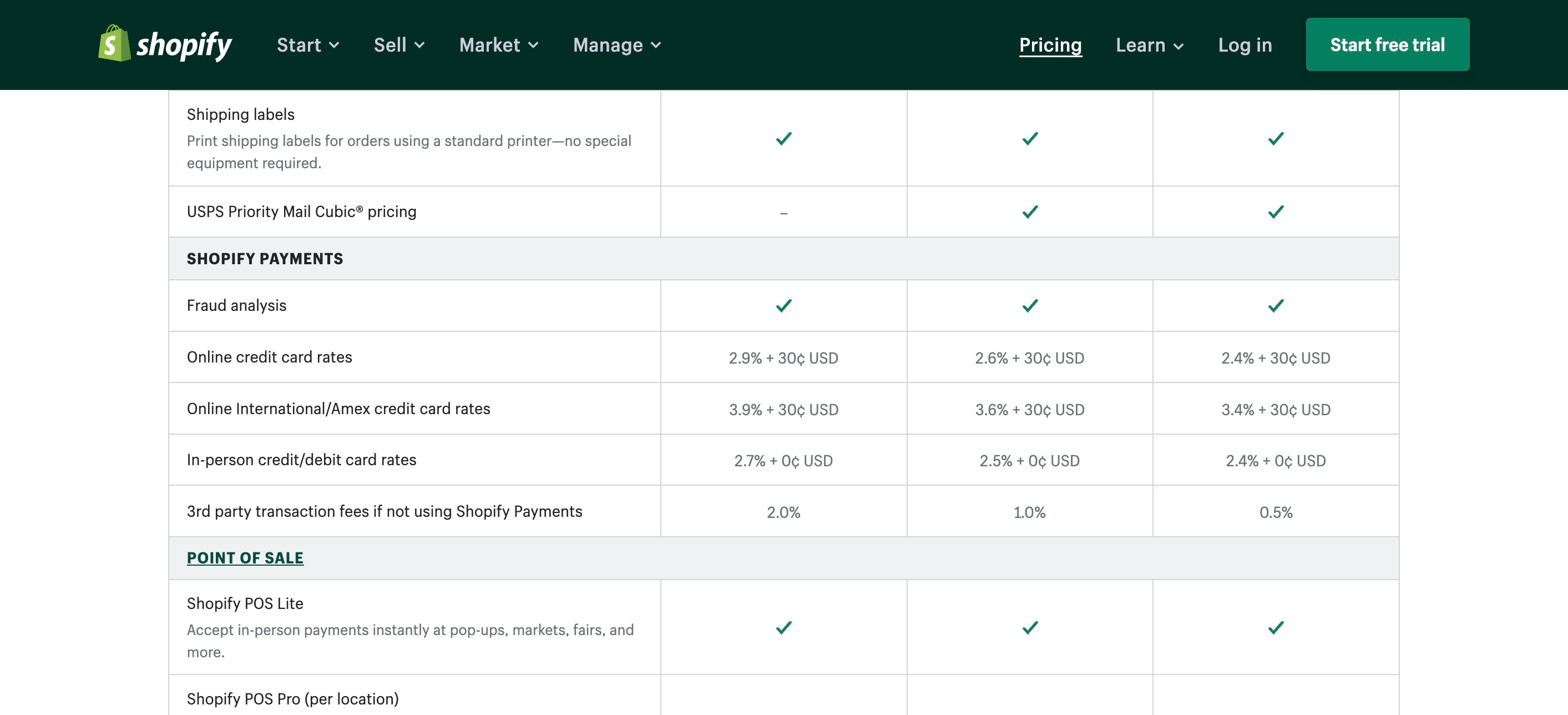
Shopify transaction fees are as follows:
- Shopify Payments: If you use Shopify’s own payment gateway it does not charge any transaction fees.
- External Payment Gateway: If you use an external payment gateway, such as PayPal or Stripe, Shopify will charge a transaction fee 2.0% (Basic) 1.0% (Shopify) 0.5%(Advanced).
- Credit card’s rate are 2.9% + 30¢ USD (Basic) 2.6% + 30¢ USD (Shopify) 2.4 + 30¢ USD (Advanced).
- Online international credit card rates are 3.9% + 30¢ USD (Basic) 3.6% + 30¢ USD (Shopify) 3.4% + 30¢ USD (Advanced Shopify).
- In person credit card rates are 2.7% + 0¢ (Basic) USD2.5% + 0¢ USD (Shopify) 2.4% + 0¢ USD (Advanced Shopify).
GoDaddy transaction fees:
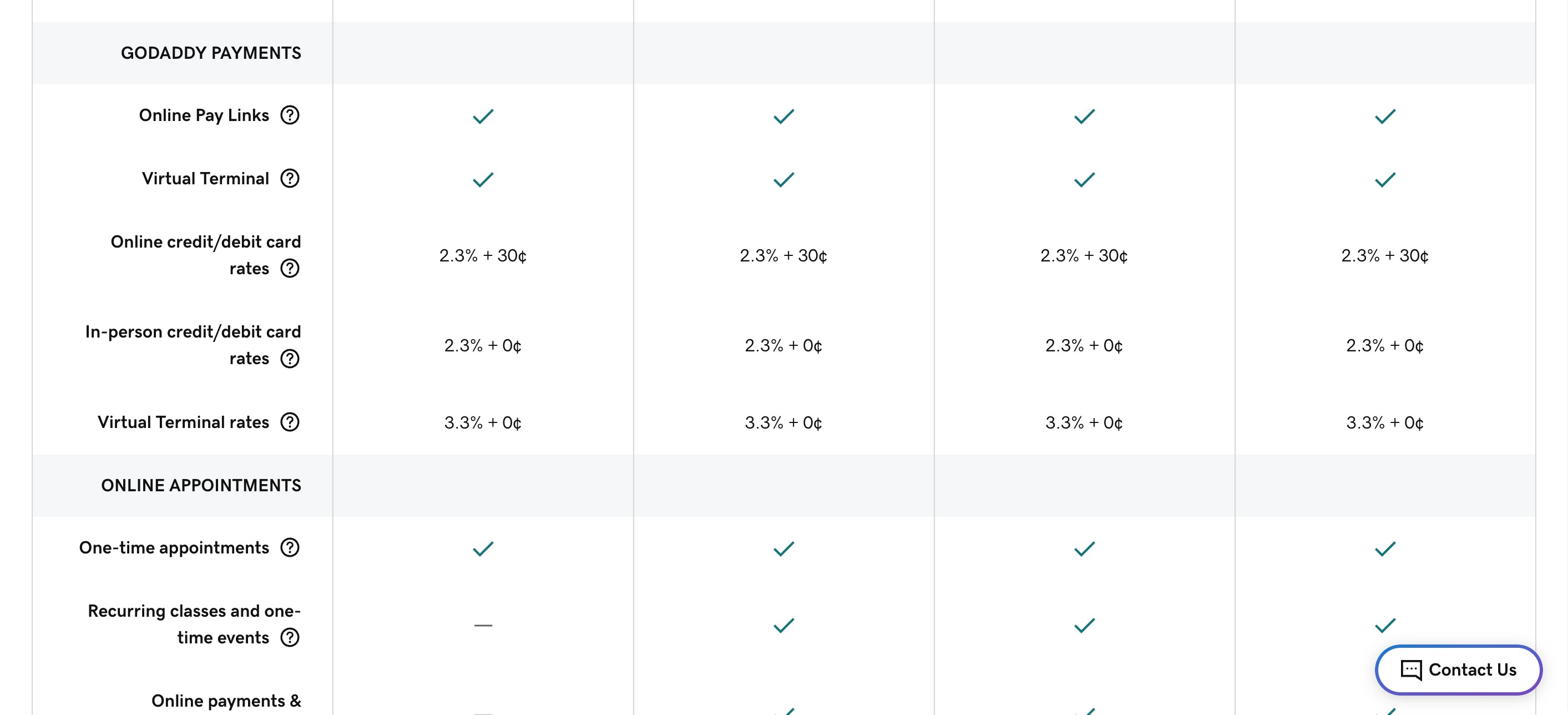
- Online credit or debit card rates are 2.3% + 30¢ USD for all plans.
- In person, credit card rates are 2.3% + 0¢ USD for all plans.
- Virtual terminal rates are 3.3% + 0¢ for all plans.
Shopify’s transaction fees are more expensive than GoDaddy’s if you use an external payment gateway. However, Shopify offers a lower rate if you use Shopify Payments.
Shopify Vs Godaddy: Pros and cons
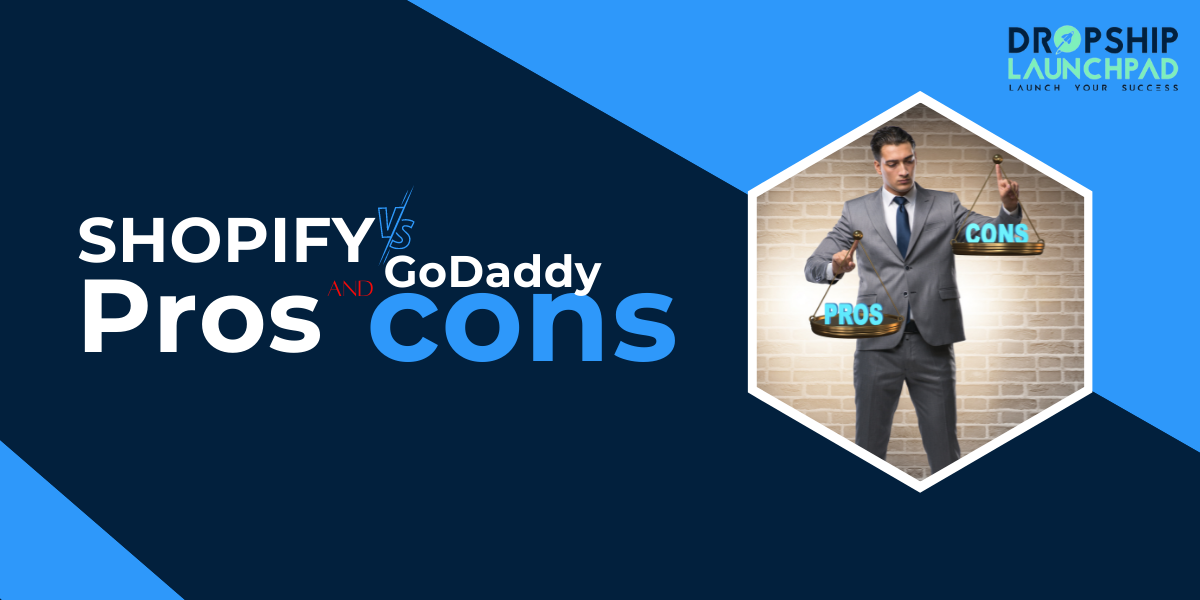
Shopify: What are the Pros?
- Shopify eCommerce platform has a simple and user-friendly interface that makes it easy to navigate.
- It offers a wide range of features, tools, and Shopify apps that businesses can use to create a unique online store. Read about Best Shopify Apps for Dropshipping in 2022
- Shopify is a scalable platform that can grow your business. As your business expands, you can add more products and features to your Shopify store.
- It offers 24/7 customer support. You can contact Shopify’s customer support team by phone, email, or live chat.
Shopify: What are the Cons?
- Shopify requires you to use a Shopify-approved payment gateway, it can be more expensive if you use a third-party payment processor.
- The Professional store template is the most customizable, but it’s also expensive.
GoDaddy: What are the Pros?
- Start-ups may find GoDaddy to be a very cost-effective option.
- You can try out Godaddy’s free editor. You may get your site up and running without spending anything, then upgrade to GoDaddy’s eCommerce plan if you like it.
- Godaddy’s eCommerce plans come with a free SSL certificate. This could save you $100 per year if you purchased an SSL certificate from Shopify.
- Traditionally, GoDaddy has offered secure hosting and domain names. A mobile app is also available so you can make changes on the go.
Godaddy: What are the Cons?
- If you’re planning to sell digital products, this may be a deciding factor for you.
- Don’t have any app store like Shopify.
- Some users feel that the GoDaddy website builder does not give them as much creative control as other website builders. GoDaddy websites are said to be less visually appealing than other web designers.
Shopify Vs GoDaddy: other features

Ecommerce
Shopify offers great products and order management solutions. It has a very nice analytical section, and there is plenty of advanced technology which allows for the sales, adding coupons, and mailing out abandonment cart emails. GoDaddy, meanwhile, also has a decent product management solution. However, it lacks analytical features.
Shopify offers a great platform for eCommerce businesses. It has all the features you need to run a successful online store.
App store
Shopify has its own Shopify app store with over 6000 apps and eCommerce tools.
All of These apps can help you with various tasks, such as marketing, accounting, customer service, shipping, and more. Godaddy does not have an app store.
Domain names
Shopify offers a free domain name that is known as “myshopify.com” with all of its plans. With its eCommerce plan, Godaddy online store builder also provides a free domain name for the first year. After the first year, you will need to pay for your domain name.
Themes and templates
Shopify’s selection of free themes is smaller, but they have 17 options that can be used as a starting point for your online store. There are also 79 paid-for premium Shopify themes if you’re looking to take things further with customizability and design features!
Godaddy has over 190 themes available; all are free. Both platform templates are easy to use, and they are great for beginners because you don’t need to learn a new coding language.
The Shopify templates are more beautiful than anything. Paid-for themes, in particular, provide you with a more versatile design aesthetic that is simply unrivaled by any other platform!
Exporting product content
Shopify allows you to export unlimited product content in a CSV file. This is very helpful if you need to move your Shopify store to another platform.
Godaddy allows you to export 1500 CSV product content in a CSV file.
Content Management system
Shopify and GoDaddy both have an easy-to-use content management system (CMS). The two interfaces work in very similar ways; however, there is one key difference between the Shopify control panel on its left side, and GoDaddy’s equivalent positioned right-hand side.
GoDaddy’s editor is the more simplistic of these two options—with fewer choices visible in one view.
Reporting and analytics
Some people might say Shopify is more complicated than other hosting platforms, but it will be worth your time if you’re looking to access information such as total sales session data and conversion rates.
In contrast with this robust feature set that allows businesses of all sizes to thrive in success – GoDaddy offers fewer analytical tools, making monitoring performance challenging for marketers trying to see how their advertising campaign went or what metrics need improvement next season!
Point of sale (POS)
Both GoDaddy, Shopify offers POS system that businesses can use to sell in brick-and-mortar stores. The Shopify POS system is very user-friendly and easy to set up.
Shopify’s more sophisticated POS features are available with the POS Pro add-on, which is priced at $89/month. This allows for unlimited registers and facilitates exchanges between customers and staff members!
Search Engine Optimization
The Shopify platform allows for almost complete freedom for your SEO. To maximize search engine visibility on your web pages, you can configure just about any element, including URL redirects and page titles, to maximize search engine visibility on your web pages!
GoDaddy SEO tools are not available with their basic plan. With the standard plan, you’ll get access to the optimization wizard. The automated process will help you figure out what keywords should be included in your content and how the page layout of each webpage affects ranking factors, all while providing suggestions for changes that can easily be made!
Dropshipping business
Dropshipping eCommerce business is a great way to start an online business. You take orders from clients, send them out, and suppliers ship the product – you don’t have any inventory or distribution costs!
Read Shopify Dropshipping Business Guide: The Ultimate Solution 2022
Shopify is best for dropshipping businesses. With 442 apps available that integrate with dropshipping companies, you’ll be able to find everything from shipping rates and payment gateways to marketing platforms so people can start buying right away!
Read Shopify drop shipping business opportunities for entrepreneurs (2022)
GoDaddy is not the best option for dropshipping. While it’s possible to do so through their platform, there are no features that automate or simplify this process.
More details read Dropshipping in 2022: Is Shopify still a good option? (Pros and Cons)
Marketing your business
Shopify has many great features and marketing tools to help market your business. You can use Shopify’s built-in blogging tool to write SEO-friendly articles and product descriptions and even create entire landing pages!
With ease, you can also take advantage of Shopify’s social media integration to share your products on Facebook, Twitter, and Instagram.
Read Email Marketing for Ecommerce: The One-stop solutions for 2022
GoDaddy also has some marketing features, but they’re not as robust as Shopify’s. For example, GoDaddy’s email marketing tool is fundamental and doesn’t allow for much customization.
Both Shopify and GoDaddy enable you to integrate Google analytics so you can track your website traffic.
FAQs about Shopify vs GoDaddy
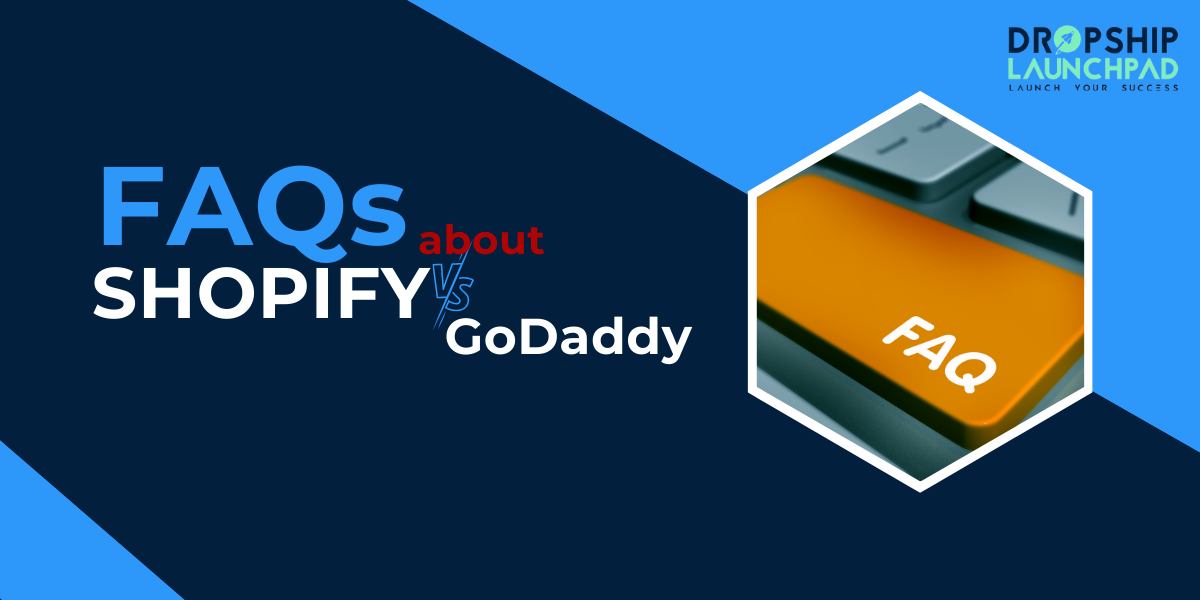
Q: Is it better to buy a domain from Shopify or GoDaddy?
Answer: Shopify offers a free domain if you sign up for their Shopify Basic Plan, while GoDaddy charges an annual fee for domain registration. If you’re just starting out and on a tight budget, Shopify is the better option. However, in case you’re planning to scale your business quickly or need more advanced eCommerce features, you may want to consider upgrading to GoDaddy.
Q: Is GoDaddy the same as Shopify?
Answer: No, GoDaddy and Shopify are two different companies that offer different products and services. GoDaddy is best known for hosting websites, while Shopify is a popular eCommerce platform used by over a million websites worldwide. GoDaddy now offers eCommerce and website-building capabilities to its users, but Shopify has more robust features for online stores.
Q: Can I use Shopify with GoDaddy?
Answer: Yes, you can use Shopify with GoDaddy by transferring your domain to Shopify or connecting an existing domain
Q: Can you use GoDaddy for eCommerce business?
Answer: Sure! GoDaddy offers eCommerce business plans that come with everything you need to get started selling online. You can choose any sales method, and they offer 24/7 support in case you need help along the way.
Final thoughts: Shopify vs Godaddy
Weighing the pros and cons of Shopify vs GoDaddy, it’s clear that both platforms have a lot to offer businesses of all sizes. So, which is the best eCommerce platform for you. Shopify is a great choice for those who need robust eCommerce features and are willing to invest in a platform that can grow with their business. GoDaddy is a good option for those who need a simple website builder and don’t mind limited customization. Ultimately, the best platform for your eCommerce business will depend on your specific needs and budget.
If you’re still unsure which platform is right for you, we suggest taking advantage of Shopify’s 14-day free trial of GoDaddy’s 30-day money-back guarantee to test out each platform before committing.
Do you have any experience with GoDaddy or Shopify? Let us know in the comments below!
Check out our other blog post comparing Shopify vs BigCommerce.
Shopify vs Shopify Plus: Which Is Best in 2022?
If you decided to get your Shopify store just press the link below
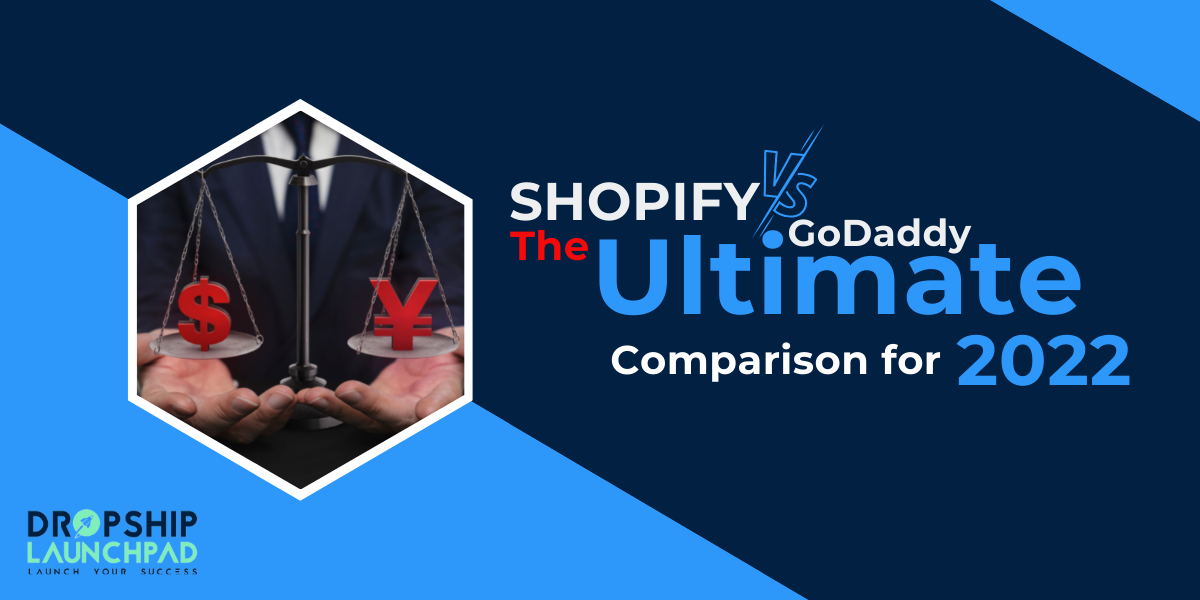
 BigCommerce vs Shopify (2023): Which is the Right Choice for You?
BigCommerce vs Shopify (2023): Which is the Right Choice for You?  Shopify vs Shopify Plus: Which Is Best in 2023?
Shopify vs Shopify Plus: Which Is Best in 2023? 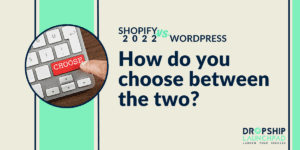 Shopify vs WordPress 2022: How do you choose between the two?
Shopify vs WordPress 2022: How do you choose between the two?  Shopify vs WooCommerce: Which Platform Will Rule in 2022
Shopify vs WooCommerce: Which Platform Will Rule in 2022